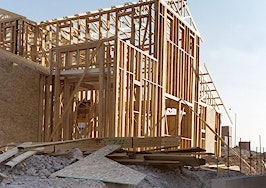Rising mortgage rates didn’t deter homebuyers last week, with applications for purchase loans up a seasonally adjusted 8 percent from the week before, according to the latest Mortgage Bankers Association’s Weekly Applications Survey.
But demand for purchase loans was still down 13 percent from a year ago, and the fact that the average loan size requested by would-be homebuyers set a new record at $418,500 may not bode well for the future.

Joel Kan
“The continued rise in purchase loan application sizes is driven by high home-price appreciation and the lack of housing inventory on the market — especially for entry-level homes,” MBA forecaster Joel Kan said in a statement. FHA and VA mortgages accounted for a smaller share of purchase applications, which Kan said also contributed to the larger loan balances, “and suggests that prospective first-time buyers are struggling to find homes to buy in their price range.”
In a forecast published Wednesday, Fannie Mae economists said they expect rising home prices and mortgage rates will dent existing home sales by 3.2 percent this year.
Pandemic stimulus checks and a rise in household savings have helped homebuyers scrape together down payments, and surveys by Redfin suggest that many buyers have rushed to get ahead of rising mortgage rates, Fannie Mae forecasters said. But Fannie Mae economists expect these drivers “to wane moving forward, leading to a progressively softening pace of sales in coming quarters.”
Rising interest rates have already had an impact on refinancing, with refi applications down 3 percent week-to-week, and 49 percent from a year ago, the MBA survey found. Requests to refinance accounted for 60.3 percent of mortgage applications, down from 64.1 percent the week before.
For the week ending January 14, the MBA reported average rates for the following types of loans:
- For 30-year fixed-rate conforming mortgages (loan balances of $647,200 or less), rates averaged 3.64 percent, up from 3.52 the week before. With points remaining unchanged at 0.45 (including the origination fee) for 80 percent loan-to-value ratio (LTV) loans, the effective rate also increased from last week.
- Rates for 30-year fixed-rate jumbo mortgages (loan balances greater than $647,200) averaged 3.54 percent, up from 3.42 percent the week before. With points increasing to 0.47 from 0.36 (including the origination fee) for 80 percent LTV loans, the effective rate also increased from last week.
- For 30-year fixed-rate FHA mortgages, rates averaged 3.64 percent, up from 3.50 percent the week before. Although points decreased to 0.44 from 0.45 (including the origination fee) for 80 percent LTV loans, the effective rate also increased from last week.
- For 15-year fixed-rate mortgages, which are popular with homeowners who are refinancing, rates averaged 2.95 percent, up from 2.73 percent the week before. With points increasing to 0.43 from 0.35 (including the origination fee) for 80 percent LTV loans, the effective rate also increased from last week.
- Rates for 5/1 adjustable rate mortgages (ARMs) averaged 3.04 percent, essentially unchanged from 3.03 percent the week beforel. With points increasing to 0.24 from 0.20 (including the origination fee) for 80 percent LTV loans, the effective rate increased from last week. Requests for ARM loans were up 26 percent, accounting for nearly 10 percent of loan requests by dollar volume.
Mortgage rates have been on the rise since the Federal Reserve announced in December that it would accelerate its timetable for withdrawing the support it’s provided to mortgage markets during the pandemic.
The upward trend in rates picked up steam with the Jan. 5 release of minutes from the Fed’s December meeting, which revealed that when it’s done tapering its mortgage purchases, the Fed may not only start raising short-term interest rates, but begin shrinking its balance sheet.
The Optimal Blue Mortgage Market Indices, which track daily changes in mortgage rates, show rates on 30-year fixed-rate conforming mortgages continue to rise, hitting 3.78 percent on Tuesday. That’s a 50-basis point increase from Dec. 20, when the index showed rates averaging 3.28 percent.
Get Inman’s Extra Credit Newsletter delivered right to your inbox. A weekly roundup of all the biggest news in the world of mortgages and closings delivered every Wednesday. Click here to subscribe.






